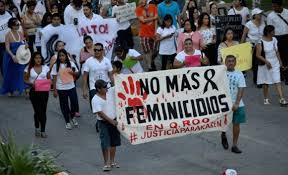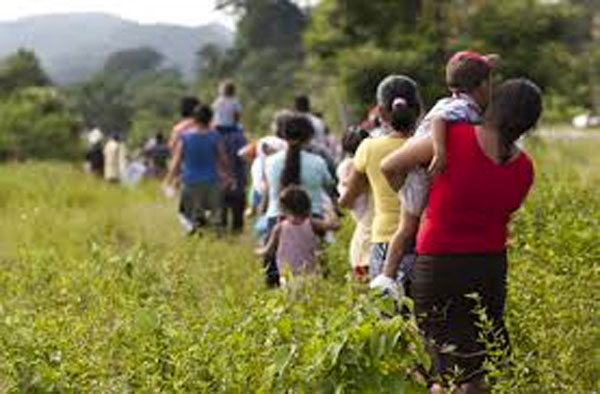Lilia D. Monzó
Peter McLaren
Suggested citation:
Monzó, L.D. & McLaren, P. (2015). Women and violence in the age of migration.
Iberoamérica Social: revista-red de estudios sociales, June 10. Retrieved http://iberoamericasocial.com/women-and-violence-in-the-age-of-migration/
Women and Violence in the Age of Migration
Women from across Latin America are migrating north at great peril to their lives – their intended destination is, as expected, the US – that giant powerhouse that in spite of its well documented historical and continued imperialist violence and exploitation against Latin America is still able to create the ideological haze that encourages hope for that illusive “American dream.” Pushed to the brink of desperation resulting from unimaginable poverty, privation, and fear, these women muster the courage that only women of color know that they have (it is imbued in their flesh and in their hearts as a result of their histories of oppression) and begin a journey that forever changes their lives.
Historically a male exodus, women’s migration North has increased significantly in recent years. They travel to cross “la linea” with their spouses, alone, and increasingly with young children. This past year we have seen a surge of undocumented women from Central America who have traveled with their children through Mexico to the US, hoping for jobs, opportunities, and a better life overall. Often, they have been led to believe that the US and the border patrol, specifically, is prepared to welcome them rather than restrict their entry (Joffe-Block, 2014).
Many of these women form part of the half a million migrants and refugees who fleeing violence, extortion and death threats, ride La Bestia (the Beast) or The Death Train (a freight train transporting grain, corn and scrap metal that is part of a network of trains that run from Mexico’s southernmost border with Guatemala) north to the US, with many migrants fortunate enough to survive the grueling 1, 450 mile trek (which may take weeks or even months) eventually ending up in South Florida. (Dominguez Villegas, 2014). Those who ride cheek-by-jowl atop the crooked spine of this monster come from Central American countries like Guatemala, El Salvador and Honduras. As the train trundles across the country, the white-knuckled migrants clutch any stable part of the freight car roof that they can so that they do not plunge headlong to the ground. There is nothing to protect them from the elements, no air conditioning to give them relief from the sweltering heat, and the Mexican leg of their perilous journey can make them prey to criminal gangs such as the Zetas cartel and corrupt government officials. The cartels are known for rape and murder and frequently demand ransoms from relatives in the US. Some fear falling asleep as much as they fear the cartels, since sliding off the boxcar roof could mean the loss of limb or life.
NAFTA (North American Free Trade Agreement) and the War on Drugs waged by the US on Latin America has created unbearable conditions in communities south of the US-Mexican border. Powerful drug cartels often buy the support of law enforcement and find allies in the US government and their own governments, even as the drug cartels terrorize entire communities. Added to this scenario of fear, is the economic devastation experienced by the people. Some US and Canadian-based corporations, under NAFTA, have made tremendous profits off maquiladoras that pay miserly wages for inhuman working conditions while others have been able to secure government support in pushing out small farmers in order to create multimillion dollar development projects and plummet their nation’s natural resources. NAFTA, thus, as neoliberal economic policy, has been particularly devastating to the national economies of Latin America, which is directly felt on a day-to-day basis among the poorest communities. This push to migrate North is a direct response to the exacerbation of previously harsh economic conditions that has resulted from the current neoliberal phase of transnational capitalism. Not surprisingly, the US maintains its bloodied hands hidden from public scrutiny and creates an image of the benevolent neighbor who comes to the rescue when Latin American countries need economic relief, an image which allows for the continued surveillance of domestic affairs in Latin America and a greater opportunity to be ready to crush any potential socialist movements at inception. In short, the continued migration north to the US among the people of Latin America serves the interests of capital and, therefore, of the US government (Monzó, McLaren, & Rodriguez, in press).
What awaits women and girls on this journey North, whether they are coming a short distance from neighboring Mexico or crossing multiple borders to arrive, is a journey of violence that is often endured beyond their entrance into the US. Although difficult to ascertain, various reports suggest that as much as 80% of women who cross the border undocumented have been raped during their journey, either on the way to the border or at the crossing. It is so prevalent that women are now being told to expect to be raped – yes, to expect it. Indeed women interviewed indicate being recommended to take birth control precautions in anticipation of possible rape. In some cases, rape is part of the cost of being brought across the border. In other cases, women find that they must provide sexual favors in exchange for protection from the other men traveling (Goldberg, 2014).
Once in the US, many women find that their American dream turns to a nightmare, as their undocumented status becomes a tool for exploitation, sexual abuse, forced prostitution, and other forms of abuse and indignities from not only employers but sometimes from spouses or partners. Increasingly, we are becoming more aware in the US about these violent abuses to human rights, about migration of women in particular, and to the specific atrocities endured by undocumented women from Latin America. Agencies are springing up that address the psychological trauma, that provide economic and legal supports, that provide avenues for safety, and that attempt to bring awareness not only to the public but to the women and their rights in the US but also awareness to the women in Latin America who might attempt to make this journey.
We see all these efforts as vitally necessary. Yet, we are especially not optimistic about the potential that information and awareness may have on stopping women from risking their lives and their psychological well being to make this journey North. When your children are starving and there is even the slightest ray of hope for their well being, you risk everything for their survival.
These women are dealing with three distinct but highly related evils. One is the horrific realities of life under capitalism, where the means of production are owned by a few at the expense of the many, and wherein the system is such that the atrocities that are committed in the name of capital accumulation are condoned as inevitable and even justified by some as divine providence. The second is a patriarchal structure that parallels the capitalist social relation of property. Under this social relation, women are mere property of men and subject to their whims, dehumanized as less rational and therefore subhuman in an attempt to justify their oppression and enslavement. Patriarchy serves to control women who produce what Karl Marx referred to as the special commodity – the next generation of workers and in this way secure capital and the continuation of the capitalist system. Patriarchy within the family manifests the social relation of property within which the capitalist worker begins to be formed (the capacity to labour) (Brown, 2012). The third evil is racism, which in relation to immigration is often discussed in terms of nativist attitudes and Euro-American superiority, but that is in effect a response to a structure of white supremacy that became racialized in order to justify slavery – an economic system that benefitted white plantation owners with free labour (Calinicos, 1993). Racism divides the working class and keeps us from uniting against capital. It also serves as a smokescreen to the hide the role of class in the destruction of communities of color (Monzó & McLaren, 2015).
As Marxists, we denounce the exploitation and violence of the many women from Latin America who are only attempting to survive and provide for their children amidst a political economy in which their value is only viewed in terms of their potential as capital. As such, the livelihood of these women and their children is of little consequence since there exists by design a pool of non-workers who are ready and willing to become workers and subsist as alienated labor. We recognize that the many antagonisms that exist are produced through capital to sustain the system and therefore must also be eradicated. We argue for a dialectical praxis against class, patriarchy, racism, and all other antagonisms – such that we may one day rid this world of the dehumanizing existence that affects us all but some more than others. We work to create a class-less society, a communism where humanity will be affirmed through freedom, equality, and love for each other and all of nature. While we may not see this development in our life times, we believe this to be a utopia founded in our true humanity and that our responsibility lies beyond our own time and space such that we must act today in accordance with the possibilities of tomorrow.
What we need to be wary of now, is the Trans-Pacific Partnership (TPP), a trade agreement with 11 other countries in Asia and the Americas (Strether, 2015). This is an economic and trade component of the Obama administration’s pivot to Asia. When NAFTA came into effect on January 1, 1994, the Zapatistas in Mexico launched their uprising in Chiapas. The TPP has sometimes been referred to as NAFTA on stilts. Essentially, it’s a US weapon for dictating economic and trading terms to countries throughout the Asia-Pacific. It a measure of dismantling national regulatory measures, including those favoring state-owned enterprises, and the protection of the “intellectual property rights” of American corporations in areas such as software, media and pharmaceuticals. It involves the mobilization of US military and political and economic assets against the rising power of China. The 11 other nations now engaged in the TPP talks include Japan, Australia, New Zealand, Brunei, Malaysia, Singapore, Vietnam, Chile, Peru, Mexico and Canada.
This could turn into the world’s largest trade partnership, comprising 40 percent of the world’s economy- a bigger proportion than is covered by the European Union. Other Asian countries are very likely to participate such as South Korea, the Philippines, Thailand and Indonesia. It is common knowledge that the US wants to delay China’s rise as an economic power in the Asia-Pacific region. Japan, the world’s third-largest economy, could also join.
The TPP is designed to create further conditions of possibility for American imperialism to ignite regional conflicts with China and North Korea involving Japan, the Philippines and Vietnam. The TPP will criminalize noncommercial sharing of works protected by copyright, and, critics say, it could create new criminal penalties for whistleblowers and journalists who access computer systems without permission. What impact it will have on migrants worldwide–and especially women–can only be anticipated, but it will not be a pleasant story.
References
Brown, H.A. (2012). Marx on gender and the family. Chicago, Il: Haymarket Books.
Callinicos, A. (1993). Race and class. London: Bookmarks.
Dominguez Villegas, R. (2014, September 10). Central American migrants and “La
Bestia”: The route, dangers, and government responses. Migration Information Source. Retrieved from: http://www.migrationpolicy.org/article/central-american-migrants-and-la-bestia-route-dangers-and-government-responses
Goldberg, E. (2014, September 12). 80% Of Central American Women, Girls Are
Raped Crossing Into The U.S. The Huffington Post. Retrieved from: http://www.huffingtonpost.com/2014/09/12/central-america-migrants-rape_n_5806972.html
Joffe-Block, J. (2014, June 2). Immigration rumors may be driving more women,
children to cross border. Fronteras: The Changing America Desk. Retrieved from: http://www.fronterasdesk.org/content/9650/immigration-rumors-may-be-driving-more-women-children-cross-border
Monzó, L.D. & McLaren, P. (2014, Dec.). Red love: Toward racial, economic and social
justice. Truthout, Dec. 18. Retrieved http://www.truth-out.org/opinion/item/28072-red-love-toward-racial-economic-and-social-justice
Monzó, L.D., McLaren, P., & Rodriguez, A. (in press). Deploying guns to expendable
communities: Bloodshed in Mexico, US imperialism and transnational capital – A call for revolutionary critical pedagogy. Cultural Studies/Critical Methodologies.
Strether, L. (2015, April 25). The TPP: Toward absolutist capitalism. Truthout. Retrieved
from: http://www.truth-out.org/news/item/30368-the-tpp-toward-absolutist-capitalism#


 Viernes 08 de abril de 2016 • 00:52
Viernes 08 de abril de 2016 • 00:52







 Users Today : 114
Users Today : 114 Total Users : 35405809
Total Users : 35405809 Views Today : 139
Views Today : 139 Total views : 3335776
Total views : 3335776